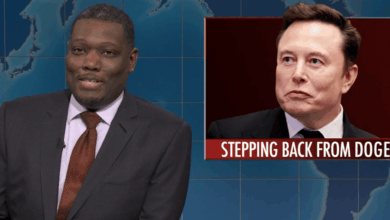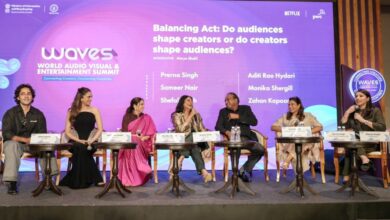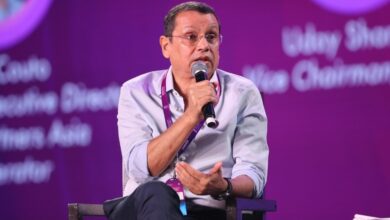Dwyane Wade and Sabrina Carpenter Interrupt SNL Monologue

Quinta Brunson had some surprise guests during her recent hosting stint on Saturday Night Live. The Abbott Elementary creator and star, known for her humor and wit, took the stage to share her experiences as a short woman in Hollywood. Referencing her past job at a phone sex line and her struggles with being 4-foot-11, Brunson emphasized that being short shouldn’t hold anyone back.
As she began a musical ode to “being short,” singer Sabrina Carpenter unexpectedly joined her on stage. The two shared jokes about the challenges of their height, including the amusing concept of “short ribs” just being regular ribs for them. SNL cast member Marcello Hernández also joined the fun, pointing out that standing next to Brunson and Carpenter made him look tall.
The biggest surprise came when NBA legend Dwyane Wade made an appearance on stage, towering over the rest of the group. Wade humorously expressed his love for being short, despite his towering height of 6-foot-4. The quartet then joined forces to finish the musical monologue, celebrating the uniqueness of being short.
Carpenter, who has been a familiar face on SNL throughout its 50th season, is set to headline the upcoming Lollapalooza music festival in Chicago. The talented singer has been a part of several memorable sketches on the show, showcasing her versatility as an entertainer.
In addition to the entertaining musical monologue, Saturday’s SNL episode featured musical guest Benson Boone and a rare sketch appearance by Colin Jost. The upcoming episodes promise more excitement, with guest hosts like Walton Goggins and Scarlett Johansson lined up, along with musical performances from artists like Bad Bunny and Arcade Fire.
Overall, Quinta Brunson’s hosting stint on SNL was a delightful mix of humor, music, and surprises, making it a memorable episode for fans and viewers alike. Stay tuned for more entertaining episodes as the season finale approaches. Title: The Impact of Social Media on Mental Health
In today’s digital age, social media has become an integral part of our daily lives. From connecting with friends and family to staying up-to-date with current events, social media platforms like Facebook, Instagram, and Twitter have revolutionized the way we communicate and interact with one another. However, with the rise of social media usage, concerns about its impact on mental health have also grown.
Numerous studies have shown a correlation between excessive social media use and negative mental health outcomes, such as increased feelings of loneliness, depression, and anxiety. One reason for this is the phenomenon of social comparison, where individuals compare their lives to the carefully curated and often unrealistic portrayals of others on social media. This can lead to feelings of inadequacy and lower self-esteem, as individuals constantly measure themselves against unattainable standards set by others.
Another factor contributing to the negative impact of social media on mental health is the constant exposure to negative news and information. With the ability to share and spread news rapidly on social media platforms, individuals are bombarded with distressing and often sensationalized content, leading to increased stress and anxiety. Moreover, the rise of cyberbullying and online harassment has also had detrimental effects on mental health, as individuals face constant scrutiny and criticism from anonymous users on social media.
Additionally, the addictive nature of social media can also contribute to mental health issues. The constant need for validation and approval through likes, comments, and shares can create a cycle of seeking external validation, leading to a decreased sense of self-worth and reliance on social media for self-esteem.
Despite these negative impacts, social media can also have positive effects on mental health. For many individuals, social media serves as a valuable tool for connecting with others, building communities, and finding support during difficult times. From mental health awareness campaigns to online therapy sessions, social media has the potential to promote mental well-being and provide resources for those struggling with mental health issues.
To mitigate the negative impact of social media on mental health, individuals can take proactive steps to manage their social media usage. Setting boundaries, such as limiting screen time and taking breaks from social media, can help reduce the negative effects of constant exposure to social media. Additionally, practicing mindfulness and self-care, such as engaging in offline activities and cultivating real-life connections, can help maintain a healthy balance between social media usage and mental well-being.
In conclusion, while social media has revolutionized the way we communicate and connect with others, it is essential to be mindful of its impact on mental health. By understanding the potential risks and benefits of social media usage and taking proactive steps to manage its impact, individuals can foster a healthy relationship with social media and prioritize their mental well-being.





